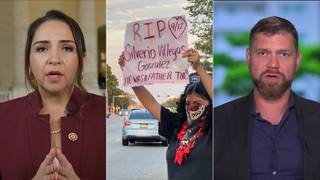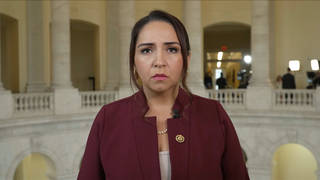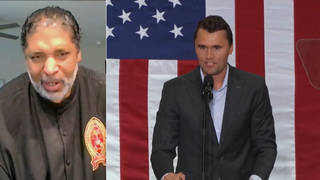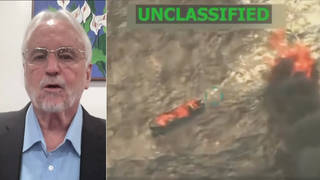
Democracy Now! co-host Juan González has co-authored a major new report for the Great Cities Institute at the University of Illinois at Chicago titled “Fuerza Mexicana: The Past, Present, and Power of Mexicans in Chicagoland,” which takes a deep look into Chicago’s Mexican community. Constituting one-fifth of the city’s population, Chicago’s Mexican residents are significant contributors to the area’s economy, but the workforce is disproportionately concentrated in some of the most dangerous, difficult, low-paying jobs. “The character of the Chicago working class has dramatically changed and is heavily Mexican,” says González. He adds that “Mexican migration saved Chicago” from the kind of post-industrial decline plaguing other cities like Detroit, Indianapolis and Cleveland.
Transcript
AMY GOODMAN: This is Democracy Now! I’m Amy Goodman, with Juan González.
We end today’s show with a major new report on Chicago, where one in five people identify as Mexican, but they’ve been largely overlooked, from politics to pop culture to academia — until now. Our own Juan González co-wrote the report, “Fuerza Mexicana: The Past, Present, and Power of Mexicans in Chicagoland.”
Juan, talk about the significance of this report. You’ve just come off of a week of presenting it, from legislators throughout Illinois to all sorts of politicians and people on the ground in Chicago.
JUAN GONZÁLEZ: Yes, Amy. Well, as part of the Great Cities Institute at the University of Illinois Chicago, we were asked by a group of Mexican leaders of nonprofit organizations in the city to try to put together data specifically on the Mexican community, not the general Latino community, because, unfortunately, most of the data collected by government agencies and research studies are under the umbrella of Hispanics or Latinos, and those are people from more than 20 different countries in Latin America, and they generally don’t zero in on the specific condition of each of these ethnic groups. And the reality is that the Mexican community in the United States represents about 60% of all Latinos, but in places like Chicago, it’s up to 75% of all the Latinos in the Chicago area are of Mexican descent. Yet there’s no data on what the condition of the Mexican community specifically is. So we tried to put together in this report the first attempt specifically to disaggregate data among Latino communities and focus on the Mexican community in particular.
And we issued the report actually last week on the anniversary of Mexican independence, September 16th, but it also has another significance in Chicago specifically, because it was 70 years ago last week, on September 16th, 1954, that the federal government launched Operation Wetback in Chicago. It had been launched in the Southwest earlier. But on that day, the INS swept through the city of Chicago, grabbing up Mexicans wherever they could to initiate a mass deportation. And if it sounds familiar, it’s because this has happened repeatedly throughout U.S. history, of mass deportations of Mexicans, beginning with the Hoover administration in the 1930s, the Eisenhower administration in 1954, then the Bush administration with their raids in the early 2000s, the Obama administration with their mass deportations. So this has been a regular feature of American history. So, we issued it on that day specifically to say, “Look, all of these mass deportations have occurred, and yet the Mexican community in the United States has continued to grow and has become pivotal.”
So, I think the key things that we — there’s lots of data in the report for people who are into, the nerds that are into data. But I think the major issues that we tried to present is, one, that the Mexican community of Chicago, of Chicagoland, and which is more than 1.5 million people, is not a new community — it’s actually been in existence for more than a hundred years, especially in the city of Chicago — and that it’s been critical to the vibrancy of Chicago, especially in the postindustrial age. When the manufacturing declined, it was really the growth of the Mexican community that allowed Chicago to have experienced an enormous renaissance.
And just to give you an example of the level of involvement of the Mexican community in Chicago’s renaissance, for example, today, 51% of all the construction laborers in Chicago are of Mexican origin. So all of the skyscrapers and condominiums that have been refurbished and rebuilt have been built on the backs of low-paid construction laborers of Mexican origin. Seventy-one percent of the landscapers in the city are of Mexican origin, 49% of the carpenters, 44% of all the cooks in the hotels and the restaurants. Fifty-six percent of all the auto mechanics in Chicago are of Mexican origin. And 36% of the factory workers, those who are still working in factories, in Chicago are of Mexican origin. So, really, the entire — the character of the Chicago working class has dramatically changed, and it’s heavily Mexican. And in fact, there’s an entire Brown Belt within Chicago of a dozen neighborhoods on the Southwest Side that are over majority Mexican.
So, there’s been — in effect, Mexican migration saved Chicago. And unlike cities like Detroit or Indianapolis or Cleveland, that also experienced postindustrial decline but never welcomed in large numbers of Latinos, by Chicago welcoming in Latinos, and specifically Mexicans, it has been able to revitalize itself. So, I think that’s one of the key things.
The other thing that’s important to understand is the dispersion of the Mexican population. Two-thirds of all of the Mexicans, of those 1.5 million Mexicans, are not in the city of Chicago. They’re in the suburbs and in the collar counties of Chicago. And there are now more than a dozen suburban towns around Chicago that have more than 50% Latino population, yet they have no Latino elected officials at the mayoralty levels or proportionally in the city councils. So the future of political representation and power of the Mexican and Latino community is really in the suburbs of Chicago. And that’s true in cities across the country. It is in the suburbs that are the growth areas.
The other important thing is that the — because the community is so young, the college-age population has dramatically changed. Thirty-two percent of all the college and graduate professional school students in Chicago are Latino — 32,000 of them, including 20,000 Mexicans — which means that’s the future of higher education for not only Chicago, but for many cities across the country. So, these are just some of the findings that we had in this report.
AMY GOODMAN: And, Juan, we’re going to link to your report. Juan González co-wrote the report, “Fuerza Mexicana: The Past, Present, and Power of Mexicans in Chicagoland,” for the Great Cities Institute at UIC. That does it for our show. Juan is also the author of Harvest of Empire: A History of Latinos in America.
Happy birthday, Hana Elias! I’m Amy Goodman, with Juan González.










Media Options